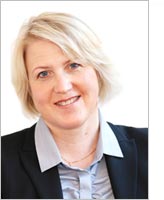Institute seminar 4th of May Dr. Mari Nygård, the Cancer Registry of Norway

The next Institute seminar will take place Wednesday 4th of May at 12:00 in the Auditorium, IKF, Montebello with the following speaker:
Dr. Mari Nygård, group leader for “HPV-related disease epidemiology” at the Cancer Registry of Norway
Title of her talk:"Human papillomavirus: epidemiology and prevention of cancer disease.”
Recent advancement of knowledge about the role of human papillomavirus (HPV) in the natural history of several human cancers has led to rapid development of cervical cancer screening technologies. Highly effective prophylactic vaccines against HPV became available in 2006. Infection with the HPV is common: 50 to 80% of sexually active persons become exposed during a lifetime. HPVs induced infections have virtually no systemic sequelae and periodically shed large amounts of infectious virus, over weeks and months, for transmission to naive individuals. Currently there is no good biomarker to separate between transient and persistent infection to optimize existing screening.
These are exiting times for cervical cancer prevention in Norway as the implementation of HPV based screening and HPV vaccination are underway. In the near future, women will be screened less often to achieve the identical cervical cancer prevention benefits, while younger generations of women will be less likely to have pre-invasive lesions in the cervix which require treatment. Furthermore, historical trends of HPV-related cancers in Norway and worldwide show an increase, suggesting a wide impact of HPV vaccination, given successful introduction of the HPV vaccine into the general population. Awareness of HPV in Norway is low as compared to other Scandinavian countries. New strategies should be considered to increase the screening participation and HPV vaccine coverage and reducing unnecessary stigma that can be associated with HPV infection and related disease.
To identify and validate a candidate biomarker with potential to improve discrimination between transient and persistent infections, we have used novel Mimotope Variation Analysis supported by elaborated bioinformatic modelling. We describe broad humoral immune activity/immune profile (IgG) and in HPV exposed persons we describe the HPV16 specific response.
